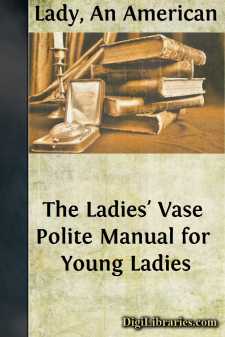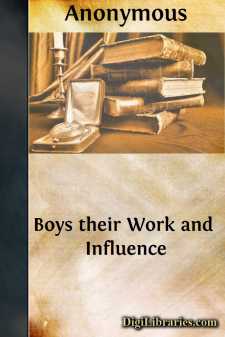Juvenile Nonfiction
- Animals 10
- Art 1
- Biography & Autobiography 2
- Boys & Men 1
- Business & Economics 3
- Cooking & Food 2
- Gardening 1
- General 32
- Girls & Women 7
- History 2
- Holidays & Celebrations 1
- Lifestyles
- Literary Criticism & Collections 5
- Nature 11
- Readers 40
- Religion 4
- Sports & Recreation 1
Lifestyles Books
Sort by:
I The Higher Levels The Real and the Ideal The Bread of Life Life's Unvarying Values The ideal is the mold in which the real is cast. Half of success is in seeing the significance of little things. He finds no weal who flees all woe. You do not make life sacred by looking sad. Sympathy is a key that fits the lock of any heart. Soul health will not come by taking religion as a dose. Many a cloud...
more...
by:
Horatio Alger
CHAPTER I "Sit up to the table, children, breakfast's ready." The speaker was a woman of middle age, not good-looking in the ordinary acceptation of the term, but nevertheless she looked good. She was dressed with extreme plainness, in a cheap calico; but though cheap, the dress was neat. The children she addressed were six in number, varying in age from twelve to four. The oldest, Harry,...
more...
by:
An American Lady
LADIES' VASE. POLITENESS. Politeness, like every thing else in one's character and conduct, should be based on Christian principle. "Honor all men," says the apostle. This is the spring of good manners; it strikes at the very root of selfishness: it is the principle by which we render to all ranks and ages their due. A respect for your fellow-beings—a reverence for them as...
more...
EXTRAVAGANCE AT COLLEGE Young Sardanapalus recently remarked that the only trouble with his life in college was that the societies and clubs, the boating and balling, and music and acting, and social occupations of many kinds, left him no time for study. He had the best disposition to treat the faculty fairly, and to devote a proper attention to various branches of learning, and he was sincerely sorry...
more...
by:
G. A. Bauman
Looked at From a Practical Standpoint It is the young man and young woman of to-day, with a practical education, who will adorn our best homes of the future. It is the manager and the financier who is the practical one. It is the young man with good habits who has a bank account, who shows evidence of becoming a financier. It is the young woman who trains herself with the duties of home-work, that will...
more...
by:
Horatio Alger
CHAPTER I "News and Mail, one cent each!" Half a dozen Chicago newsboys, varying in age from ten to sixteen years, with piles of papers in their hands, joined in the chorus. They were standing in front and at the sides of the Sherman House, on the corner of Clark and Randolph Streets, one of the noted buildings in the Lake City. On the opposite side of Randolph Street stands a gloomy stone...
more...
I Be honest with the world and the world will be honest with you. This is the fundamental truth of all real prosperity and happiness. For the purposes of every man's daily affairs, all other maxims are to this central verity as the branches of a tree to its rooted trunk. The world will be honest with you whether you are honest with it or not. You cannot trick it—remember that. If you try it, the...
more...
LINES WRITTEN ON BEING TOLD THAT A LADY WAS "PLAIN AND COMMONPLACE." You say that my love is plain, But that I can never allow When I look at the thought for others That is written on her brow. The eyes are not fine, I own, She has not a well-cut nose, But a smile for others' pleasures And a sigh for others'...
more...
LECTURE I. The Value of a Good Reputation. "Laying up in store for themselves a good foundation against the time to come."—1 Tim. vi. 19. n this language St. Paul asserts a principle which should commend itself to the mature consideration of every youthful mind. If the young would have their career honorable and prosperous—if they would enjoy the respect and confidence of community; if they...
more...
by:
Anonymous
INTRODUCTION The following papers were written at the request of one who had read the somewhat similar papers addressed to girls. The object aimed at in both books has been to try and help Boys and Girls of the so-called working classes to recognize their duties to God and their neighbour, and to use on the side of right the powers and opportunities which God has given them. It seems to the author...
more...











